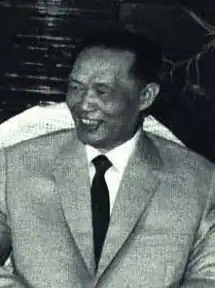Hoàng Văn Hoan
Hoàng Văn Hoan | |
|---|---|
 | |
| Vice Chairman of the National Assembly of Vietnam (1st, 2nd, 3rd, 4th, 5th, 6th) | |
| In office 23 April 1958 – 24 June 1979 | |
| Chairman | Trường Chinh |
| General Secretary of the Standing Committee of the National Assembly (1st, 2nd) | |
| In office April 1958 – June 1962 | |
| Chairman | Trường Chinh |
| Succeeded by | Xuân Thủy |
| Communist Party Secretary of Hanoi | |
| In office January 1961 – June 1961 | |
| Deputy | Nguyễn Thọ Chân Trần Minh Việt Trần Anh Liên |
| Preceded by | Trần Danh Tuyên |
| Succeeded by | Nguyễn Lam |
| Member of the Politburo of the Communist Party of Vietnam (2nd, 3rd) | |
| In office October 1956 – December 1976 | |
| General Secretary | Hồ Chí Minh Lê Duẩn (as First Secretary) |
| Ambassador of Vietnam to China with accreditation as North Korea & Mongolia | |
| In office 1950 – April 1957 | |
| Succeeded by | Nguyễn Khang (to China) Trần Độ (to North Korea) |
| Member of the Central Committee of the Communist Party of Vietnam | |
| In office August 1945 – December 1976 | |
| General Secretary | Trường Chinh Hồ Chí Minh Lê Duẩn (as First Secretary) |
| Personal details | |
| Born | Hoàng Ngọc Ân 1905 Quỳnh Lưu, Nghệ An Province, Annam Protectorate, French Indochina |
| Died | 18 May 1991 (aged 85–86) Beijing, China |
| Political party | Communist Party of Vietnam (expelled in 1979) |
Hoàng Văn Hoan (1905 – 18 May 1991)[1] was an early member of the Indochinese Communist Party and a member of the Politburo of the Communist Party of Vietnam from 1960 to 1976. Hoan was born in Nghệ An Province in 1905,[2] and was an associate of Ho Chi Minh since the 1920s. He was a crucial link between the Democratic Republic of Vietnam (North Vietnam) and the People's Republic of China. He served as North Vietnam's first ambassador to China from 1950 to 1957 and was Vice Chairman of the National Assembly's Standing Committee from 1958 to 1979.
Known for his pro-Chinese stance, Hoan's influence peaked in the early 1960s when North Vietnam's leadership temporarily aligned with China during the Sino-Soviet dispute. In 1963, as part of this policy shift, Hoan was appointed head of the party's International Liaison Department at the same time that the more pro-Chinese Xuân Thủy became Foreign Minister.
Beginning around 1965, however, as Soviet aid became critical to the war effort, Hanoi began to improve relations with the Soviet Union, leading to increased tensions with Beijing. In this new political atmosphere, the Vietnamese leadership, directed by First Secretary Lê Duẩn, replaced officials who were strongly identified with the previous pro-Chinese policy. Both Xuân Thủy and Hoan were removed from their key foreign policy posts.
Despite his diminished role, Hoan was still used for sensitive diplomatic missions due to his personal connections in Beijing. In May 1973, he conducted secret talks in China regarding the Cambodian Civil War. He traveled to China again in 1974, officially for "medical treatment," a trip that coincided with unsuccessful Sino-Vietnamese border negotiations.[3] His political career effectively ended at the Fourth National Party Congress in December 1976, where he was removed from the Politburo and the Central Committee as the party formalized its pro-Soviet orientation.
After being subjected to political isolation and surveillance, Hoan defected in July 1979. While traveling to East Germany for medical care, he eluded his escorts during a transit stop in Karachi, Pakistan, and sought refuge at the Chinese consulate before flying to Beijing. At a press conference in August 1979, Hoan stated that Vietnam's persecution of its ethnic Chinese minority was "even worse than Hitler's treatment of the Jews" and accused Vietnamese leaders of becoming "subservient to a foreign power," a reference to the Soviet Union. In his writings, he also alleged, without providing evidence, that the CPV's Central Committee had decided in 1982 to increase opium production to raise foreign currency.[4]
Hoan authored a political memoir titled Giọt nước trong biển cả. It was translated into English by China's state-run Foreign Languages Press as A Drop in the Ocean: Hoang Van Hoan's Revolutionary Reminiscences. He died in Beijing on May 18, 1991.[5]
Works
- Hoang Van Hoan (1988). A Drop in the Ocean: Hoang Van Hoan's Revolutionary Reminiscences. Beijing: Foreign Languages Press. ISBN 9780835122559.
- — (1989). Selected Works of Hoang Van Hoan. Beijing: Foreign Languages Press. ISBN 9787119006048.
References
- ^ "Hoang van Hoan, Vietnam Aide Who Defected to China, Dies at 86". The New York Times. 23 May 1991.
- ^ Brigham, Robert K. (2011). "Hoang Van Hoan". In Tucker, Spencer C. (ed.). The encyclopedia of the Vietnam War: a political, social, and military history (2nd ed.). ABC-CLIO. p. 498. ISBN 9781851099610.
- ^ Balázs Szalontai, Hoàng Văn Hoan và vụ thanh trừng sau 1979. BBC Vietnam, April 15, 2010: http://www.bbc.co.uk/vietnamese/vietnam/2010/04/100415_hoangvanhoan.shtml.
- ^ "Narco-Terrorism: The Kremlin Connection". www.heritage.org. Archived from the original on 26 September 2007. Retrieved 12 January 2022.
- ^ "Hoang Van Hoan, Vietnam Aide Who Defected to China, Dies at 86". The New York Times. 23 May 1991.
External links
- Hanoi's Push. Time, Aug. 20, 1979.
- Indochina: Five Years of Communist Rule[unfit]
- Beijing and the Vietnam Conflict, 1964–1965
- Factionalism in North VietnamA